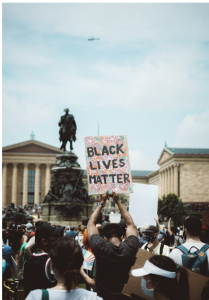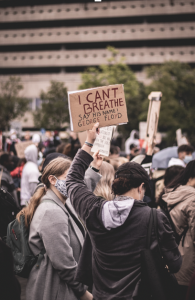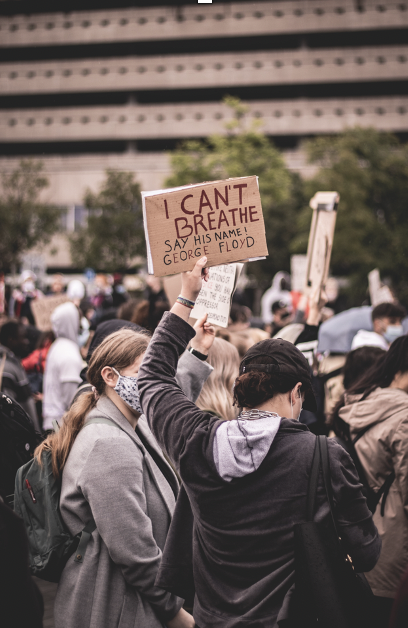Thousands of people have taken to the streets, amid the COVID-19 pandemic, to demand justice and equal treatment for Black Americans after the murder of George Floyd. Throughout these protests, the slogan “Black Lives Matter” is often used by those condemning the treatment of Black Americans at the hands of police officers around the country. Is this phrase a trademark, and if it is, who owns it? Do trademark principles allow the Black Lives Matter Foundation, an entity associated with the movement, to have a trademark in phrases such as “Black Lives Matter” so that they can prevent other entities from commercially profiting from using it?
Let’s start by discussing some trademark principles.
Trademark Principles
You may be wondering, what is a trademark. A trademark identifies and distinguishes the source of a product or service used in commerce. It can consist of a single word, commonly known as a “word mark,” a design/logo, and can also be a phrase or slogan. For example, trademarks include things such as “Apple” (word) for the company that sells iPhones and also a large yellow “M” (design) for the company that sells burgers and fries.
Trademarks give an owner rights to use the mark, and the ability to stop others from using it or a similar mark if there would be likely confusion. Why would there be confusion? The idea of confusion refers to the concern that consumers might see one trademark for a product or service, and think it originates from a different source.
Although a trademark used in commerce is valid without any formal registration, there are benefits for a registered mark. A trademark owner can strengthen its rights through federal registration. Once federally registered, the owner gets exclusive rights to use the mark nationwide for whichever goods or services it was registered for. If an unauthorized third party uses the registered mark or one confusingly similar to it on goods or services, the trademark owner could sue for infringement more broadly than if the mark is not registered. Now that you understand the basics of trademarks and registration, let’s consider how it applies to a potential trademark on “Black Lives Matter.”
“Black Lives Matter” Trademark (Or Not)
As previously mentioned, anyone using the mark in commerce can have a trademark which is distinctive and identifies goods or services. Does the phrase “Black Lives Matter” really indicate the source of any goods or services provided by the Black Lives Matter Foundation? Probably not. The issue is that most people think of “Black Lives Matter” as describing a general social phenomenon, and not a term that identifies goods/services of the Black Lives Matter Foundation. This same issue applies to those attempting to register the phrase even though they are unassociated with the movement. For example, if an unassociated entity tried to register the slogan for a clothing item, consumers wouldn’t connect the phrase to the entity, but rather to the social movement.

What happens if “Black Lives Matter” and other slogans associated with social movements become trademarked for a certain good or service by those not formally associated with the movement? The phrase would no longer be available to use by others in commerce on those similar goods/services unless the use constituted trademark “fair use.” The movement could use the phrase, just not in commerce for goods/services. Descriptive fair use allows the use of another’s trademark as ordinary language, instead of using the trademark to indicate the source of the products or services. For example, the Black Lives Matter Foundation could still say “Black Lives Matters” on signs if it was used to say these lives do matter, rather than to indicate association with a source.
Depending on what good or service someone registers the “Black Lives Matter” slogan for, the owner could theoretically exclude others from using the slogan in a similar way. If there was already a registered trademark for the slogan on clothing including sweatshirts, the Black Lives Matter movement would not be able to create sweatshirts with the mark because there would be a likelihood of confusion and they could be sued by the original owner. The idea that a registered “Black Lives Matter” trademark by a company for a product could prevent the movement from using the mark in commerce on its own similar goods doesn’t seem fair, since the movement could raise funds by placing the slogan on sweatshirts, for example. This brings us back to the discussion of descriptive fair use, however. The Foundation is likely using the phrase “Black Lives Matter” to literally say that black lives do matter and not to indicate any association with a source. If this is the case, there is likely not even a trademark infringement issue if the Foundation does not use the mark as a source.
Many applicants have attempted to register the “Black Lives Matter” slogan. Since June 2020, 13 entities/persons have filed applications to register the phrase in connection with clothing and signs, for example. The USPTO refused to register this slogan because it is merely informational and had no source identifying capabilities but is rather a phrase to convey support for the issue if racial injustice. As of November 2020, no one has successfully registered “Black Lives Matter” as a trademark with respect to any class of goods or services.
I Can’t Breathe Trademark

“Black Lives Matter” is not the only phrase in connection with the movement that has been attempted to be registered. The phrase “I can’t breathe,” Eric Garner’s last words, appeared in a trademark application after his death. A woman tried to register this slogan for the use on hooded sweatshirts, in an attempt to profit off of his momentous death. The USPTO was concerned that consumers would confuse a connection between Eric Garner’s estate and the woman’s good because the nation was very familiar with the phrase. The slogan reappeared in applications after George Floyd’s death, whose final words mirrored Eric Garner. These “I can’t breathe” marks were rejected for similar reasons as the denial of the “Black Lives Matter” slogan because they were not a source identifier, but rather conveyed a message.
A Product Benefitting the Movement
Despite application rejections of certain phrases, there are trademarks out there which attempt to benefit the movement. A woman filed an application to trademark a #BlackLivesMatter Moscato and a #SayHerName Sweet Red for her online wine business after the killings of George Floyd and Breonna Taylor. Using wine as a form of protest, how creative! She says proceeds from the sale of the wine would be donated to groups that support the cause. This phrasing, which is actually used to identify a source, could obtain trademark protection. These phrases are different from “Black Lives Matter” because people won’t just associate these wine names with the social movement given the additional words added beyond “Black Lives Matter”. In fact, she has already started printing the labels for her wine in hopes of getting her trademark registered!
We can also look at a trademark related to the tragic death of George Floyd. The Floyd family applied for the trademark “The George Floyd Foundation,” which is to be used as a source identifier for services which would educate the public about police reform and for goods related to the service. This gives the family the ability to sell various merchandise connected to the trademark to raise money for the cause. This is a good example of a phrase that identifies a source, i.e., that the Foundation is associated with George Floyd. This is, undoubtedly, a trademark use that activists for the cause appreciate and support.
A Proposal
Because there is no registered trademark for “Black Lives Matter”, the slogan can be used by any unassociated entity on various goods such as sweatshirts and t-shirts. Trademark law has yet to create an exception for phrases associated with social movements. While “Black Lives Matter” may not specifically indicate a source and does not function as a traditional trademark, there should be an exception to permit a trademark for phrases in social movements. Although trademarks are traditionally only granted when something on good/services is used to identify source, entities formally associated with a social movement should be permitted a trademark even when it does not clearly indicate source. Unassociated sources should not be able to profit from the phrase simply by selling the phrase on a mug or a t-shirt. Had the USPTO granted the right of the phrase to, for example, a non-profit, no other entity could use the slogan for their own gain if that would create confusion as to what source was being referred to.
It’s Complicated
The slogans created for social movements, such as “Black Lives Matter” and “I Can’t Breathe,” show the complicated nature of trademarks not associated with a specific single source, but rather a broader movement. On one hand, the slogans are in the public domain and do not identify any specific source. On the other hand, for policy and fairness reasons, any profit from slogans for a social movement should belong to the foundation, person, non-profit, etc. which champions the phrase and its goals. It is a complicated situation because these phrases belong to a movement and those who care about racial injustice, but current legal principles do not allow a valid trademark if consumers don’t necessarily identify the phrase with the official entity.

Lily Liermann
Assistant Blogger
Loyola University Chicago School of Law, J.D. 2022
